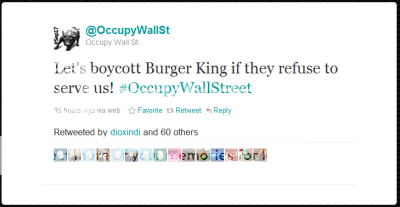Last night I was following the continuing protesting against Big Corps and the bankers of Wall Street. The umbrella name is called ‘Occupy Wall Street’. Scores of protesters have been down on Wall Street in New York protesting the actions of the bankers and corporations who subvert our democracy and who didn’t go to jail after crashing the economy in 2008. I support their efforts 100% but one tweet last night kind of shocked me and made me laugh in a sad way. I think the current protesters need a refresher course on how to protest corporate power. It doesn’t include complaining when a big corporation doesn’t serve you food.
60 Minutes carried Big Corp. water on tax rate story
The CBS News show 60 Minutes usually can be counted on for hard news about controversial subjects but a recent story about corporate income tax rates in the US showed how even a once great investigative news show can present a story so lopsided one would think it was repeating a press release.
Correspondent Lesley Stahl had a story about some large corporations who have moved their headquarters out of the country to dodge the US’s 35% tax rate on corporate income. She showed that some of the moves were a sham when she went to talk to the people in charge and they weren’t there.
Next came a short section where Rep. Lloyd Doggett (D-TX) complained about the companies that were dodging the taxes and questioned their patriotism.
Stahl then spent the remainder of the time giving big corporations an opportunity to whine and complain about the hardship of paying their fair share even though most don’t actually pay it and when they didn’t back in 2004, it didn’t help the economy.
Economist Martin Sullivan told Congress these patent and profit transfers are accounting tricks that have allowed companies to chip away at the 35 percent and save tens of billions of dollars. He says that from 2007 to 2009 these maneuvers helped lower Pfizer’s average tax rate to 17 percent; Merck to 12.5 percent, and GE to just 3.6 percent.
“It’s really remarkable, as I review the data, is the consistency with which you see this phenomenon. The taxes are going down, the profits are shifting offshore at an accelerated rate over the last few years,” Sullivan said.
So now these companies have profits accumulating overseas in places like Zug.
If they bring the money home, it’s taxed the full 35 percent. If they leave it overseas, the IRS can’t touch it. In other words, the tax law all but forces companies to keep their money out of the country, indefinitely.
“We leave the money over there. I create jobs overseas; I acquire companies overseas; I build plants overseas; and I badly want to bring that money back,” John Chambers told Stahl.
Chambers told Stahl Cisco has almost $40 billion overseas that could be brought back to the U.S.
The total amount of money U.S. companies have trapped overseas is $1.2 trillion. Chambers is advocating for a one-time tax break to allow them to bring that money home at a rate of, say five percent. That would, he says, stimulate the economy and create jobs.
“What is your downside for money that isn’t going to come back anyhow? I’d say your downside is zero,” he told Stahl.
But the Obama administration opposed this idea. When it was tried in 2005, the Treasury did rake in billions of dollars, though very few jobs were created.
John Chambers of Cisco also complains “All we’re asking is: Give us a level playing field. Get us close.”
Of course Chambers doesn’t say that Cisco and others who have operations in Europe don’t have to pay health insurance for workers – the European Union has universal health care and his fellow businessmen fought tooth and nail against the US health care reform efforts that then led to a much watered down “Affordable Healthcare Act”. Also as noted briefly we did try a one time tax reduction and it failed to generate jobs.
The story Lesley Stahl did the other night was about as bad for the middle class as the long wet kiss the entertainment division does with the show “Undercover Boss”.
Sure corporations should have a chance to lower their overall tax rate but it needs to be done with a fair intent – not as a dodge. Average Americans have been though the legal system for less.
I wouldn’t be opposed to a lower tax rate but that then must be balanced with a closing of all the loopholes. Fair is fair.
Big business is NOT our friend
 I have been watching the events surrounding the massive oil spill in the Gulf of Mexico and it reaffirms my philosophy that Big Business is NOT our friend.
I have been watching the events surrounding the massive oil spill in the Gulf of Mexico and it reaffirms my philosophy that Big Business is NOT our friend.
I’m not a Marxist or advocate state ownership of business but I do feel that industry needs to be heavily regulated. Big businesses, left to their own devices, will screw us over in some form if we aren’t watching them like a hawk. The corporation only answers to their owners and shareholders. With some rare exceptions, benevolence from big business only exists if it doesn’t cost them very much money and if they benefit from it.
History is full of the damage and chaos when big business is left to run amok. The big example is the Crash of 1929. The Dow Jones Industrial Average lost 89 percent of its value by 1932 and put us into a depression that didn’t subside until the start of World War II. That was 12 years of massive unemployment and suffering.
We had the robber barons of the 19th century which included John D. Rockefeller, John Jacob Astor and Andrew Carnegie. These guys were the Goldman Sachs and AIG of their day. Men like that were known for extensive use of child labor, deadly working conditions and strong arm tactics if workers complained.
Upton Sinclair wrote “The Jungle” that exposed conditions in the U.S. meat packing industry and led to the Pure Food and Drug Act in 1906. Now we seem to be returning to those days when you didn’t know if your food or medicine was safe. The food industry have worked for years to reduce the regulations in place.
More recent follies included the Savings and Loan crash in the 1980s and there was Black Monday in October 1987 when the stock market dropped 500 points or 22.6 percent of value. We’re still experiencing the damage from the crash in 2008 and the collapse of the housing loan market.
The BP oil spill isn’t the first or last example of big business raping our environment in the name of profits. Google “superfund” and you will find a lot of information on trashed environments that taxpayers paid to have cleaned up — places like Love Canal, Times Beach and smaller locations like old factories that found it was cheaper to dump their hazardous wastes on their property than to have it properly disposed.
The problem with “big business” is shown in little ways as well. Grocery chains don’t locate in low income areas so those people are forced to pay more for their food. Money and favorable policies meant to help family farms end up going to agriculture conglomerates like ConAgra. Wal-mart treats their employees so bad that many have to apply for food stamps and welfare to make ends meet.
What bothers me the most is most people let these things happen or look the other way. One reaction is that they would rather have a cheaper price than a company that acts ethically and responsibly. Big business isn’t the driver of the economy. The engine of our economy is small businesses— the mom and pop locally owned shops and services. Big business’ charity work comes from their advertising budget and most of their profit leaves the area and contributes nothing where they operate.
An obstacle to stopping this screw over is the government. Legislators in D.C. or in the states are bought and paid for by big bushiness in some way. Both Democrats and Republicans. If we want to return our country to the people we need to only vote for people who will refuse to be bought.
Unless that happens, things like the BP oil spill will continue.
*This article appeared in the July/August 2010 issue of The Central Ohio Humanist*

